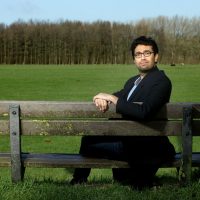What is a PhD?
At the end of his contract, Vishal Onkhar reflects on what a PhD is really about. He realises the answer depends on when you ask the question: at the beginning, the middle, or the end.
At the end of his contract, Vishal Onkhar reflects on what a PhD is really about. He realises the answer depends on when you ask the question: at the beginning, the middle, or the end.

(Photo: Sam Rentmeester)
English only
What is a PhD? This seems like a straightforward question that any layperson or ChatGPT could address, but it has different answers to a PhD candidate depending on when you ask it – at the beginning, the middle, or the end.
If you had posed this question to me four years ago, before the start of my contract, I would have said that a PhD is the highest degree one can obtain, and so, the ultimate test of intelligence and mental fortitude. I might have added that it was four years of research, at the end of which you published a book and got to use the title of Doctor. I would also have noted that it was a difficult road, not everyone’s cup of tea, but that I was determined to give it my best shot.
If you had asked me in the middle (especially during the corona years), I would have told you it was a limbo, where you sometimes didn’t know exactly what you were working towards, but had just decided to trust the process and your professors. I might have compared it to assembling a jigsaw puzzle without knowing the specifics of the finished picture, only its genre. Metaphors aside, I’d have defined a PhD as a collection of scientific papers tied together by an overarching narrative that explained some phenomenon or other. I also would have highlighted the effort, failures, and stamina that went behind each of those papers.
A PhD is less about the degree or the research itself, and more about cultivating a disciplined way of thinking
If you quiz me about this now, at the end of my contract, I’d say a PhD is less about the degree or the research itself, and more about cultivating a disciplined way of thinking. After all, most PhD research is hyper-specialized and incremental anyway, like adding a grain of sand to a vast beach of knowledge. Your grain may never again be picked up and examined individually, but it’s because of grains like yours that there even is a beach for people to benefit from. And if you’re really lucky, some kid will come by one day and build a sandcastle using your grain.
Critical thinking
No, a PhD is really an extended course on thinking critically, within and outside your subject of research. Does this mean you need a PhD to be able to think critically? No. But does a PhD formalise the critical thinking process and force you to make it a habit? Yes. Is it the best available test of critical thinking? Possibly. It is like a whetstone that sharpens the blade of your mind to be able to better analyse everything the world throws at you – personal relationships, ideologies (political, national, religious, economic), scientific research, and ethical dilemmas – and hopefully, equips you to make informed, independent decisions on them.
And so, at the end of a PhD defence, when the committee pronounces that “society can rely on your judgement”, I think it means more than just in relation to the results of your research. I think it means you will be the first to admit when you don’t know something, defer to the expert opinions and scientific consensus of those more knowledgeable than you, be sceptical of claims no matter their source, be willing to change your mind when presented with sufficient, incontrovertible evidence, and only ever assert your position on a matter when you’ve done your due diligence before forming an opinion. That is a PhD.
Vishal Onkhar is from Chennai, India and pursuing his PhD in Vehicle Engineering at TU Delft. He is an avid player of chess and video games, but he also harbours a special interest for reading and writing fantasy fiction. He doesn’t drink coffee but good music and film have the same effect on him.
Comments are closed.